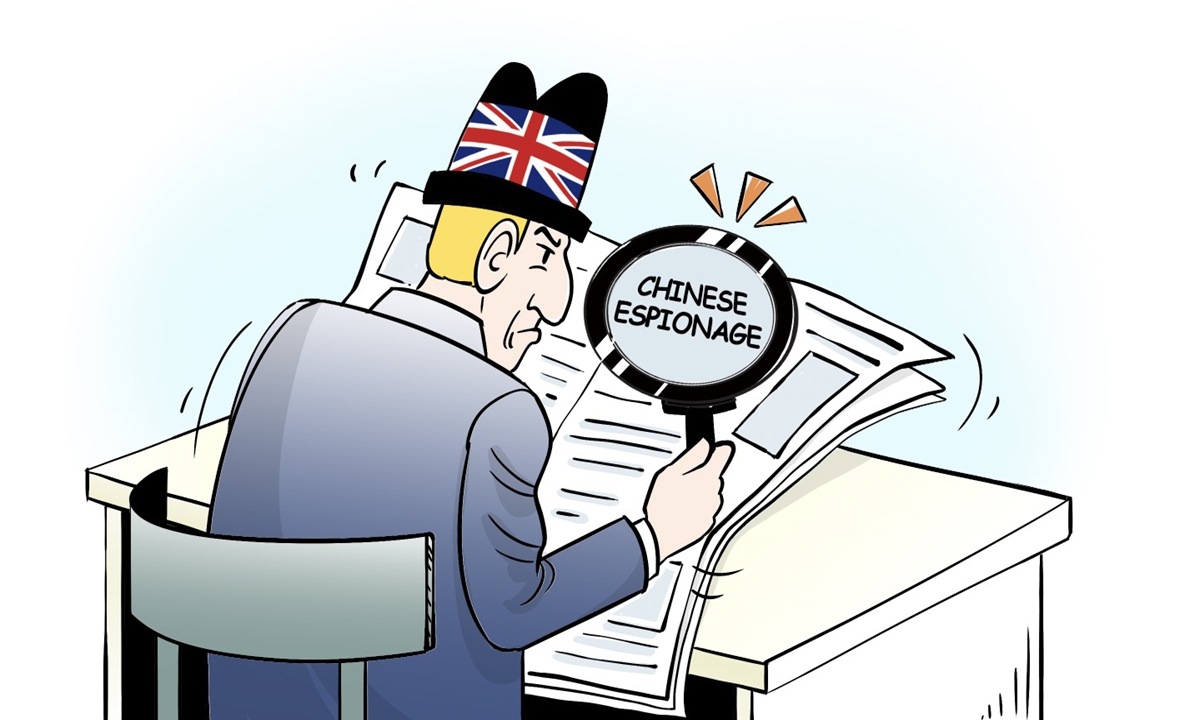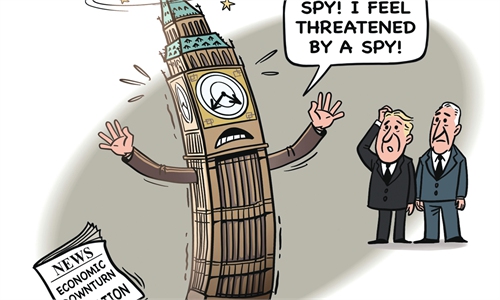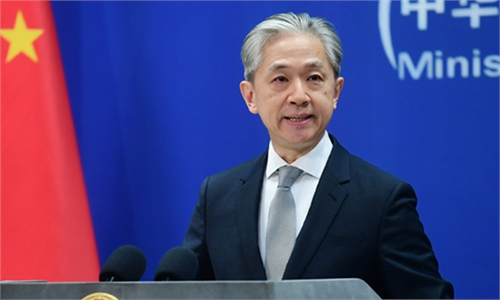
Illustration: Chen Xia/GT
Some time ago I wrote an article for the Global Times, highlighting the West's burgeoning paranoia over Chinese spies, and made a lighthearted comment speculating whether the next item to be banned on suspicion of having an espionage dual purpose might be chopsticks.Now, the truth has become stranger than fiction. The UK media has reported that London's Ministry of Defence fears British Army cap badges could be used to spy on military personnel. Cloak-and-dagger is an old-fashioned term for undercover work, but I never expected it to extend to haberdashery. What next, will the laces in army boots be used by China to control the direction in which soldiers march? Perhaps buttons from Beijing sewn onto uniform sleeves will enable the garments to transmit each keystroke of a soldier at a computer keyboard. Is there a risk that Chinese-made berets, caps or helmets will allow "Chinese spies" to read the thoughts of anybody wearing one?
Until now, I thought that the most absurd manifestation of the "Red spy scare" infecting the West was the American politician who proclaimed that Chinese garlic - yes, you read that correctly, Chinese garlic - represented a clear and present security threat. Last December, Republican Senator Rick Scott wrote to the country's Department of Commerce demanding the government launch an investigation. He claimed a severe public health concern over "garlic grown in Communist China." Another was the "arrest" of a pigeon in India as a suspected Chinese spy: It was freed after spending eight months in avian detention when it turned out to be a Taiwan racing bird that got lost on the way home.
The cap badge story originated in the London-based Financial Times (FT), which cited its sources as highly-placed anonymous individuals. Sometimes, the "anonymous source" can be a device used by unscrupulous journalists to mask the veracity of a dubious story, but the FT is an internationally renowned business and politics newspaper, followed and trusted by politicians and business people around the world, therefore its stories should be taken seriously. However, this story is so laughable it is difficult to take it seriously. The report claimed the army was delaying the rollout of new cap badges - embroidered cloth for officers, metal for other ranks - because of fears they could be bugged by China.
All badges bear a royal crest of the ruling monarch, the titular head of the armed forces. So, when King Charles III succeeded his late mother Queen Elizabeth II, her insignia was replaced by his on military uniforms. A British firm holds a £2.9 million ($3.68 million) contract to provide the badges, and it uses material sourced from China in its supply chain. This is because the UK cannot produce them as quickly or as cheaply as Chinese manufacturers. The FT quotes a "senior UK defense official" saying: "There is a fear that tracking devices or a GPS transmitter could be embedded in the cap badges." The report also reveals that the UK parliament's defense committee decided to have commemorative coins made in Britain, rather than much more cheaply in China, out of "security concerns."
If the worriers of the West are to be believed, the Chinese nation must be the world's masters of espionage, given that they have found - according to anti-China antagonists in legislatures and media - multifarious and ingenious ways of eavesdropping on other countries.
Chinese state actors have been accused of trying to turn an astonishing 20,000 individuals in the UK into spies by contacting them via LinkedIn, the business networking platform. Then, there was the scare over alleged data harvesting by the TikTok app, which President Joe Biden considered banning in the US until his advisors found it an indispensable tool in his re-election campaign and opened up a presidential account. Technology from Huawei, weather balloons, electric vehicles (both cars and trucks) and shipyard cranes (Biden signed an executive order banning them from US ports), have all been labeled security threats. Is it a coincidence that many of these products are also challenging America's share of whatever market is involved, including even Chinese garlic which suffers huge US tariffs? Is Biden more interested in protecting domestic industries than hunting down spies? It might explain some of the more risible aspects of this phenomenon.
There is also cynical political capital to be earned in America, Britain and elsewhere if China can be portrayed as a foe, and then attacked as a foe. Ultimately, these ridiculous ruses have been exposed for the fiction they are.
Perhaps any diplomat or politician in London shaking hands with their Chinese counterparts would like to sanitize their hand afterward, for fear of being contaminated with something like a Chinese spy virus. And, of course, they'd have to make sure the sanitizer wasn't made in China.
The author is a journalist and lecturer in Britain. opinion@globaltimes.com.cn


